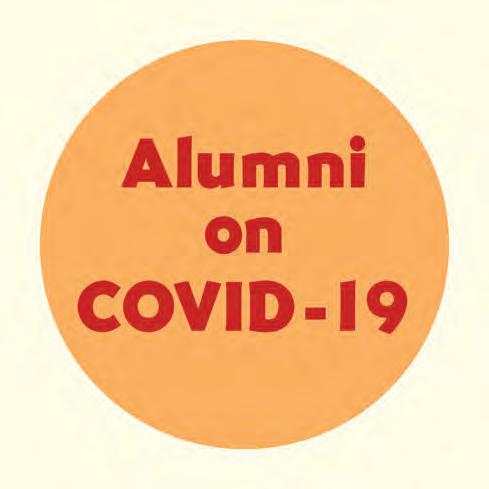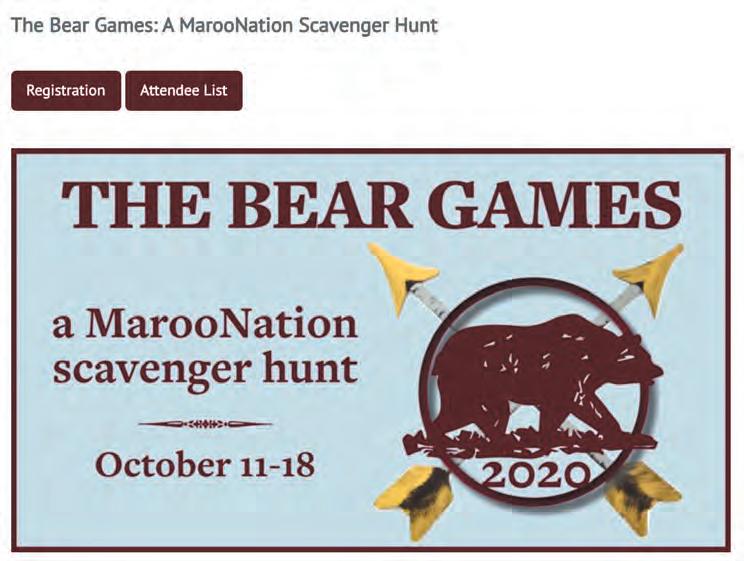
9 minute read
Bears in the wild
How have MSU alumni been?
TINSLEY MERRIMAN MSU Admin Reporter @merrimantinsley
Every year, Missouri State’s Homecoming is filled with events for those on campus. MSU alumni are also invited to see how their alma mater has changed since they have left.
Alumni are still able to return to campus this year, though most events have been moved online due to COVID-19. In spite of the pandemic, many alumni are functioning well post-graduation.
George Winston graduated in 1993 and has since gone on to become the director of admissions at Washington University in St. Louis. He is also president of MSU’s Black Alumni Council.
Winston said “support and structures” at MSU have come a long way since he was a student and he would return if offered the chance.
“I think those (supports and structures) are a benefit compared to where I was when I was an undergraduate student at the campus, and I think
that those things would definitely help me continue to grow,” Winston said.
Winston is mainly involved in higher education, and his job has not been affected greatly by the pandemic. This has allowed him to remain employed, and he said he feels blessed and fortunate for it.
Nick Wegner was a former university ambassador before his graduation in 2005. Since graduation, Wegner has gone on to become a director at the Entertainment Software Association and part of the Recording Industry Association of America. Both have allowed Wegner to work with music, be it in the video game world or reality.
Wegner said his graduating class made history by being the last class of Southwest Missouri State University, prior to the change of name to Missouri State University. Wegner said he also met his wife while on campus and has attended eight prior Homecoming events.
Wegner said while it is unfortunate Homecoming couldn’t be done “normally” this year, MSU is doing everything in its power to include

students and alumni in events.
Elizabeth Rogers is a graduate of 2017. She was a four year member and senior captain of the Sugar Bears Dance Team.
After graduating, she became Director of Recruitment & Selection at Northwestern Mutual, a financial services company. She said she was inspired by a “wise professor” from her MKT 485 course, Marketing Yourself, to get involved with her community after settling into a career.
Rogers said her work has been largely unaffected by the pandemic. She has continued Graphic by Caleb Stafford/THE STANDARD working and is thankful her Even though Homecoming won’t look the same as it company has remained success- has in previous years, planners are doing what they ful. can to include students and alumni in events.
Rogers said she would return to campus “in a heartbeat” and continues to keep is best for the general population of the campus. up a correspondence with her past professors, For a full list of events and schedules during roommates, teammates and friends. Homecoming, the Missouri State Alumni Asso-
She said MSU has “done well” in handling ciation has the full details on their website, alumCOVID-19 by communicating and doing what ni.missouristate.edu/homecoming
CANCELED: Yell Like Hell
PAIGE NICEWANER Columnist @i_am_paiger
After finishing up a week of midterms, Missouri State’s 2020 Homecoming week is something to look forward to. Because of COVID-19, some events have been modified to allow for social distancing, moved to a virtual format or were just canceled.
In the past, Yell Like Hell, a choreographed dance and chanting competition, was a traditional Homecoming week event.This is the first year it has been removed and replaced with a different event, MoState Live.
Yell Like Hell was a popular Homecoming competition, especially for Greek Life at MSU, but it remained a divisive issue within the community.
Walter Kayesse, former president of Phi Beta Sigma Fraternity, Inc. and Missouri State alumnus said that the FSL community had been distanced from each other for a while.
“IFC, PHA and NPHC have always had sort of an estranged relationship in a way,” Kayesse said. “When I was NPHC president in 2017, it was the same.”
There had been controversy over how other FSL chapters were participating in Yell Like Hell.
“I know there was a time when there were NPHC organizations that performed with IFC and PHA, but more recently, they wouldn’t partner with us and yet, we would see them use our organization’s moves on video,” Kayesse said. “It was a pretty big issue because the other members felt a very exploitative energy from the whole ordeal. I don’t remember if we got a formal apology.”
Stepping and strolling are not just dance moves; they are cultural movements that can be traced back to African roots, specifically the gumboot dance, which originated in South Africa.
According to the World of Step organization, during the late 19th and early 20th centuries, South African migrant workers were forced to endure grueling work conditions, suffering from severe health issues, standing in water for hours. Hundreds of people were killed every year.
Instead of fixing the drainage system, white bosses would hand out wellington boots - gumboots - for the workers to protect their feet. Since they weren’t allowed to talk, the miners would communicate with each other by slapping their hands on the boots. Thus, the gumboot dance was born.
In its modern use, stepping and strolling can be credited to the Black Greek letter organizations made up of the Divine Nine chapters: Alpha Kappa Alpha Sorority, Inc., Alpha Phi Alpha Fraternity, Inc., Delta Sigma Theta Sorority, Inc., Iota Phi Theta Fraternity, Inc., Kappa Alpha Psi Fra-
Illustration by Jadie Arnett/THE STANDARD Formerly an FSL staple during Homecoming, Yell Like Hell is now canceled in more than one way.

ternity, Inc., Omega Psi Phi Fraternity, Inc., Phi Beta Sigma Fraternity, Inc., Sigma Gamma Rho Sorority, Inc. and Zeta Phi Beta Sorority, Inc.
These nine organizations make up the National Pan-Hellenic Council that formed in 1930 at Howard University.
Stepping and strolling, when performed, represent strength and unity and are meaningful to NPHC.
Predominantly white fraternities and sororities at MSU have been criticized for stealing step and stroll routines without crediting NPHC or understanding what the dance moves symbolize.
“It’s not a fad. It’s not some cool Black dance. It is historical, cultural and most importantly, it’s about identity,” Kayesse said. “I encourage people to do their research and learn something new instead of just seeking to appropriate it.”
The Homecoming committee in years past have dealt with concerns of cultural appropriation. This year, the event was completely removed.
Katherine Morton, the 2020 Homecoming committee chair, said that the event had been canceled because there had been issues of cultural appropriation in the past.
“It has been in the works for many years to change Yell Like Hell,” Morton said. “Stepping and strolling is cultural appropriation, and that is something that is not tolerated on this campus. Stepping and strolling is a part of NPHC’s history and is not something that should be exploited by organizations not educated or dedicated to
their history.”
Other members of FSL chapters also voiced their concern about Yell Like Hell and called for its removal.
Sydney Neal, Homecoming co-chair for Gamma Phi Beta, said she was not going to compete in Yell Like Hell this year, unless it was modified.
“I wasn’t going to have my chapter participate in Yell Like Hell if they didn’t change it,” Neal said.
With recent heightened racial tensions in America, Yell Like Hell had become a prominent issue for some members of the FSL community.
“Because of all the Black Lives Matter movements, I think people were putting a lot of pressure on the committee to change it. I think I had finally just taken the time to educate myself. Stepping and strolling is meaningful for historically Black sororities and fraternities, and it’s just not right for the rest of the Greek community to stick a silly name on it and give it less meaning,” Neal said.
For this year’s Homecoming, Yell Like Hell will be replaced with MoState Live, an event where organizations can make up a skit, dance or both in a way that is related to a Missouri State tradition.
Although Yell Like Hell will not take place at Homecoming this year, its controversy and ethical concerns still remain. Looking forward, taking into consideration how MSU handles cultural competence, one of the public affairs pillars, is something to think about when issues like this arise.

The BearGames:
A MarooNation Scavenger Hunt
Screenshot from Missouri State University Alumni Association website The Bear Games: Scavenger Hunt is a week-long virtual event, available to both students and alumni. Teams of up to four participants may complete “missions,” including answering prompts with text, photos or videos. The top student and alumni teams will receive prize packs.
GRETA CROSS Editor-in-Chief @gretacrossphoto
Despite the cancelation of many Homecoming events this year, alumni can still connect with their alma mater by participating in The Bear Games: A MarooNation Scavenger Hunt.
In this virtual scavenger hunt — a competition between current students and alumni — participants complete as many “missions” as possible to earn points using an iPhone or Android device, according to the MarooNation website.
Players will complete missions — available Oct. 11-18 — by answering questions and prompts with text, photos and video.
According to Brynna Plaster, alumni relations event coordinator, some of the missions contain Missouri State trivia, while others are just fun, creative activities for participants.
“We got the idea for a Homecoming scavenger hunt from talking with other schools early on about what they were doing to engage their alumni and students during the pandemic,” Plaster said. “The virtual scavenger hunt rose to the top of our list because it’s something that all Bears can participate in.”
After the Sunday, Oct. 11 start date, new missions will be added to the scavenger hunt on Tuesday, Oct. 13, Thursday, Oct. 15 and Saturday, Oct. 17, with 50 new missions added daily — a total of 200 available missions, Plaster said.
Current students and alumni may create teams of up to four people. The top alumni and student teams will be awarded Missouri State swag prize packs.
Registration for the scavenger hunt is free through the Missouri State Alumni Association and can be completed there. Once registered, participants will receive a confirmation email with instructions and a password to enter the game, the MarooNation website states.
Plaster said there is no registration deadline; participants can register all the way up until the end of the event.
The top student and alumni teams will be awarded prize packs, including Missouri State merchandise.
As of Wednesday, Oct. 7, over 50 individuals have registered for the scavenger hunt, according to Plaster.
Along with the virtual scavenger hunt, a number of new virtual Homecoming events have been added to this year’s calendar, including: • Homecoming Staycation Trivia Night (Oct. 15 at 7 p.m. via Zoom) • Virtual Bear Painting Class (Oct. 16 from 6-7:30 p.m. via Zoom) • The Boomer’s Virtual 5K Run and Walk (ends Oct. 31)







